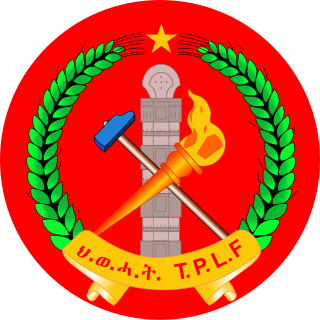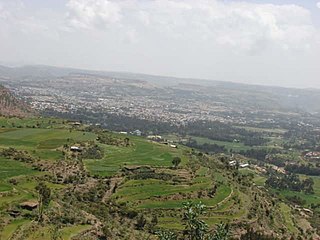Related Research Articles

The government of Ethiopia is the federal government of Ethiopia. It is structured in a framework of a federal parliamentary republic, whereby the prime minister is the head of government. Executive power is exercised by the government. The prime minister is chosen by the lower chamber of the Federal Parliamentary Assembly. Federal legislative power is vested in both the government and the two chambers of parliament. The judiciary is more or less independent of the executive and the legislature. They are governed under the 1995 Constitution of Ethiopia. There is a bicameral parliament made of the 108-seat House of Federation and the 547-seat House of Peoples' Representatives. The House of Federation has members chosen by the regional councils to serve five-year terms. The House of Peoples' Representatives is elected by direct election, who in turn elect the president for a six-year term.

The Tigray Region is the northernmost regional state in Ethiopia. The Tigray Region is the homeland of the Tigrayan, Irob and Kunama people. Its capital and largest city is Mekelle. Tigray is the fifth-largest by area, the fourth-most populous, and the fifth-most densely populated of the 11 regional states.

Meles Zenawi Asres, born Legesse Zenawi Asres was an Ethiopian politician and a former anti-Derg militant who served as president of Ethiopia from 1991 to 1995 and as prime minister from 1995 until his death in 2012.
The Ethiopian People's Revolutionary Democratic Front was an ethnic federalist political coalition in Ethiopia that existed from 1988 to 2019. It consisted of four political parties: Tigray People's Liberation Front (TPLF), Amhara Democratic Party (ADP), Oromo Democratic Party (ODP) and Southern Ethiopian People's Democratic Movement (SEPDM). After leading the overthrow of the People's Democratic Republic of Ethiopia, it dominated Ethiopian politics from 1991 to 2019. In November 2019, the EPRDF was dissolved, and Prime Minister and EPDRF chairman Abiy Ahmed merged three of the constituent parties into his new Prosperity Party, which was officially founded on 1 December 2019.

Adwa is a town and separate woreda in Tigray Region, Ethiopia. It is best known as the community closest to the site of the 1896 Battle of Adwa, in which Ethiopian soldiers defeated Italian troops, thus being one of the few African nations to thwart European colonialism. Located in the Central Zone of the Tigray Region, Adwa has a longitude and latitude of 14°10′N38°54′E, and an elevation of 1907 meters. Adwa is surrounded by Adwa woreda.

The Tigray People's Liberation Front, also known as the Tigrayan People's Liberation Front, is a left-wing ethnic nationalist, paramilitary group, and the former ruling party of Ethiopia. It was classified as a terrorist organization by the Ethiopian government during the Tigray War until its removal from the list in 2023. In older and less formal texts and speech it is known as Woyane or Weyané.
Abay "Amha" Tsehaye was an Ethiopian politician and a prominent personality in the Ethiopian political discourse. He was active in the political scene from the early 1960s up to late 2018, initially as one of the founding members of the TPLF, followed by important positions from 1990 to 2018 within the EPRDF, which led the Ethiopian government, after which he retired and moved to live in Axum and Mekelle in Tigray.

Agame is a province in northern Ethiopia. It includes the northeastern corner of the Ethiopian Empire, borders in Eritrea, Tembien, Kalatta Awlalo and Enderta in the south, and both the Eritrean and Ethiopian Afar lowlands in the east. This relative location of Agame is at the strategic crossroads between the Red Sea and the northern Tigrayan plateau on the other. In pre-1991, Agame had a total area of about 4,889 square kilometres (1,888 sq mi) with an estimated population of 344,800.

Tigrayans are a Semitic-speaking ethnic group indigenous to the Tigray Region of northern Ethiopia. They speak the Tigrinya language, an Afroasiatic language belonging to the Ethiopian Semitic branch.
The Marxist–Leninist League of Tigray (MLLT) was a semi-clandestine Hoxhaist Communist Party that held a leading role in the Tigrayan Peoples' Liberation Front (TPLF) in the 1980s. The majority of the TPLF leadership held dual membership in the MLLT, including Meles Zenawi, Prime Minister of the Federal Democratic Republic of Ethiopia from 1995 until his death in 2012.
Kuma Demeksa is an Ethiopian politician. Since 24 April 2015, he has been an Ethiopian ambassador to Germany. From 2008 to 2013 he was mayor of Addis Ababa; previous positions include President of the Oromia Region (1995–2001), and Minister of Defense (2005–2008). He was one of the founders, as well as a current member, of the Oromo Peoples' Democratic Organization (OPDO), which is part of the ruling coalition, the Ethiopian People's Revolutionary Democratic Front (EPRDF).
Gebru Asrat is an Ethiopian politician, former president of Tigray Region (1991–2001), and one of the top leaders of the Tigray People's Liberation Front (TPLF) and the Ethiopian People's Revolutionary Democratic Front (EPRDF) until around 2000, when he founded a new party, Arena Tigray.

The Transitional Government of Ethiopia (TGE) was an era established immediately after the Ethiopian People's Revolutionary Democratic Front (EPRDF) seized power from the Marxist-Leninist People's Democratic Republic of Ethiopia (PDRE) in 1991. During the transitional period, Meles Zenawi served as the president of the TGE while Tamrat Layne was prime minister. Among other major shifts in the country's political institutions, it was under the authority of the TGE that the realignment of provincial boundaries on the basis of ethnolinguistic identity occurred. The TGE was in power until 1995, when it transitioned into the reconstituted Federal Democratic Republic of Ethiopia that remains today.

Ethnic discrimination in Ethiopia during and since the Haile Selassie epoch has been described using terms including "racism", "ethnification", "ethnic identification, ethnic hatred, ethnicization", and "ethnic profiling". During the Haile Selassie period, Amhara elites perceived the southern minority languages as an obstacle to the development of an Ethiopian national identity. Ethnic discrimination occurred during the Haile Selassie and Mengistu Haile Mariam epochs against Hararis, Afars, Tigrayans, Eritreans, Somalis and Oromos. Ethnic federalism was implemented by Tigray People's Liberation Front (TPLF) leader Meles Zenawi and discrimination against Amharas, Ogaden, Oromos and other ethnic groups continued during TPLF rule. Liberalisation of the media after Abiy Ahmed became prime minister in 2018 led to strengthening of media diversity and strengthening of ethnically focussed hate speech. Ethnic profiling targeting Tigrayans occurred during the Tigray War that started in November 2020.
This Timeline of the Tigray War is part of a chronology of the military engagements of the Tigray War, a civil war that began in the Tigray Region of Ethiopia in early November 2020.

Tigrayan nationalism is an ethnic nationalism that advocates the interests of Tigrayan people in Ethiopia. Inspired predominantly by the Tigray People's Liberation Front (TPLF) with its predecessor Tigray Liberation Front (TLF), this type of nationalism holds that Tigrayans are an independent group with unique ancestry, heritage, history and culture outside Ethiopia. As such, they claim Tigray is the source of Ethiopian civilization and utterly a benefactor of state-building without other local ethnic groups. Tigrayan nationalists accuse Amharas of imposing their cultural, economic and political hegemony over Tigrayans.

The fallof the Derg was a military campaign that resulted in the defeat of the ruling Marxist–Leninist military junta, the Derg, by the rebel coalition Ethiopian People's Revolutionary Democratic Front (EPRDF) on 28 May 1991 in Addis Ababa, ending the Ethiopian Civil War. The Derg took power after deposing Emperor Haile Selassie and the Solomonic dynasty, an imperial dynasty of Ethiopia that began in 1270. The Derg suffered from insurgency with different factions, and separatist rebel groups since their early rule, beginning with the Ethiopian Civil War. The 1983–1985 famine, the Red Terror, and resettlement and villagization made the Derg unpopular with the majority of Ethiopians tending to support insurgent groups like the Tigray People's Liberation Front (TPLF) and Eritrean People's Liberation Front (EPLF).
The 1995 Ethiopian Federal Constitution formalizes an ethnic federalism law aimed at undermining long-standing ethnic imperial rule, reducing ethnic tensions, promoting regional autonomy, and upholding unqualified rights to self-determination and secession in a state with more than 80 different ethnic groups. But the constitution is divisive, both among Ethiopian nationalists who believe it undermines centralized authority and fuels interethnic conflict, and among ethnic federalists who fear that the development of its vague components could lead to authoritarian centralization or even the maintenance of minority ethnic hegemony. Parliamentary elections since 1995 have taken place every five years since enactment. All but one of these have resulted in government by members of the Ethiopian People's Revolutionary Democratic Front (EPRDF) political coalition, under three prime ministers. The EPRDF was under the effective control of the Tigray People's Liberation Front (TPLF), which represents a small ethnic minority. In 2019 the EPRDF, under Abiy, was dissolved and he inaugurated the pan-ethnic Prosperity Party which won the 2021 Ethiopian Election, returning him as prime minister. But both political entities were different kinds of responses to the ongoing tension between constitutional ethnic federalism and the Ethiopian state's authority. Over the same period, and all administrations, a range of major conflicts with ethnic roots have occurred or continued, and the press and availability of information have been controlled. There has also been dramatic economic growth and liberalization, which has itself been attributed to, and used to justify, authoritarian state policy.
Getachew Assefa is an Ethiopian politician and senior member of the Tigray People's Liberation Front (TPLF). He had served as the Director General of the National Intelligence and Security Service (NISS) from 2001 until Prime Minister Abiy Ahmed came to power in 2018.
Brigadier GeneralTefera Mamo is an Ethiopian military officer who was subjected to multiple imprisonments during the EPRDF and then the Prosperity Party regime.
References
- 1 2 Admin (2022-01-07). "Sebhat Nega and Jawar Mohammed released from prison". Borkena Ethiopian News. Retrieved 2024-11-19.
- ↑ Observer, Ethiopia (2018-05-18). "Amid EPRDF Reshuffle, Sebhat Nega, a TPLF Founder, Retires from Think Tank". Ethiopia Observer. Retrieved 2024-11-19.
- ↑ "Sebhat Nega | Profile | Africa Confidential". www.africa-confidential.com. Retrieved 2024-11-19.
- ↑ "Mereja Forum - Login". mereja.com. Retrieved 2024-11-19.
- 1 2 Observer, Ethiopia (2018-05-18). "Amid EPRDF Reshuffle, Sebhat Nega, a TPLF Founder, Retires from Think Tank". Ethiopia Observer. Retrieved 2024-11-19.
- ↑ Admin (2021-01-08). "Sebhat Nega, TPLF founder and ideologue, captured alive". Borkena Ethiopian News. Retrieved 2024-11-19.
- ↑ "Aksum University honors Sebhat Nega". Horn Affairs. 2016-07-02. Retrieved 2024-11-19.
- ↑ "Aksum University honors Sebhat Nega". Tumblr. Retrieved 2024-11-19.